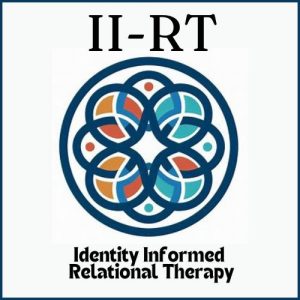Identity informed relational therapy (II-RT)
A new approach to working with identity in psychodynamic therapy

Identity informed relational therapy (II-RT)
As counselors and therapists, our experience tells us that clients have complicated inner lives, which sit within a complex social world. We also know that unpacking the conflicting thoughts, feelings and drives which underpin these social worlds is often the key to unlocking clients’ full potential.
Identity informed relational therapy (II-RT) is a new, evidence-driven and theory led approach which helps you and your client rapidly understand their social and personal identities and relationships. IIRT also provides tools to explore how your client actively uses their constellation of identities and relationships to manage difficult feelings, conflicts and thoughts.
This new form of ‘identity therapy’ also provides a tool-kit of opportunities, based on well established social identity principles, to help clients reshape their inner (and outer) worlds to relieve distress and to support healthy grow.
Why an identity therapy approach?
Although they often focus on the same subject matter, psychodynamic and systems therapy type approaches have rarely been brought together with the field of social psychology. Drawing on decades of research on social identity and contemporary approaches object relations, II-RT provide a clear method of case formulation based on identity theory and object relations. Arising from this are a set of practical concepts, tools and guidance– all based on evidenced psychological processes.
Identity informed relational therapy is suitable for clients who want to combine insight based work (in which the underlying historical causes of distress are uncovered) with more active solution based approaches. Thus, it presents an opportunity for clients who feel ‘stuck’ in purely insight based approaches.

What does Identity Informed Relational Therapy (II-RT) consist of?
Identity informed relational therapy is an approach to working with clients rather than a manualised ‘cookie cutter’ technique. It comprises a distillation and simple summary of core processes integrated from its two main underlying traditions (social psychology and object relations). This allows the practitioner to work from a theoretically informed position. It also introduces new concepts which help practitioners develop clear client formulations and identify the most fruitful areas for exploration and intervention.
Key Features
-
Evidence-based
The concepts and tools which are used have all been demonstrated in the existing evidence base, and the underlying concepts and theories of change are all well understood.
-
Non-diagnostic
II-RT is non-diagnostic. You work with the client where they are at. Diagnosis and labels which clients bring with them are, however, important identities which we often work with.
-
Clear theoretical approach
Drawing on decades of social identity research and evidence and well established object relations approach insights, II-RT is built on solid foundations. However, it is also presented in a jargon-free, practical focussed way.
-
Practical and flexible tools
Abstract ideas may be interesting to think about, but they do not help clients. II-RT gives a clear set of guidelines into working with identities in a way which makes sense you and to your clients.
-
Non-prescriptive
II-RT provides a set of principles, concepts and tools which work with your current approach, not against it. This makes it easy to incorporate into your day to day practice.
-
Client focused
The way the clients inner and outer worlds meet, in terms of identities, roles, conflicts and synergies all drive the therapeutic process.
Find out more
Stay in touch to hear about training opportunities as they become available.
